#hazbin meta
Explore tagged Tumblr posts
Text
Alastor being aroace makes his dynamic with Vox like 100% funnier. It's a villain rivalry, you immediately know people will look at these two and think "they crave each other carnally", except only one of them has the capacity for it. Which is the perfect set up for a ridiculous one-sided obsession, but then Alastor is shown to be acting way more unbothered by Vox than he actually is. Dude is walking the streets of Hell menacingly staring into cameras and doesn't even have the excuse of homosexuality. Both of these fuckers are goofy as hell.
#hazbin hotel#alastor#vox#they have everything wrong with them#tv or radio#original post#hazbin meta#aroace alastor
19K notes
·
View notes
Text
a brief take on the whole "Alastor's smile is permanent" discussion
hello all!
I've seen a lot of people theorizing lately that Alastor actually smiles all the time because his smile is magically, physically fixed onto his face. All of this seems to come from the fact that he's practically grimacing rather than smiling during the scene where he breaks down in ep8:
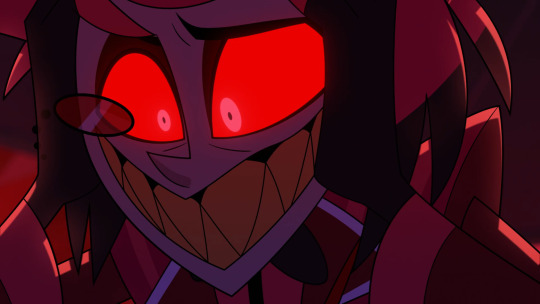
As well as this frame of his deal with Charlie: (lower res sorry)

I will say, I do like some of the implications of this theory. The sheer spite of his creditor forcing him to smile as an addition to their deal, almost like a sort of forced silence, is a neat concept. It's fun and dramatic. Plus, of all things, of course Alastor would claim the "smile at all times" policy and make it his own to pretend that it was his decision all along lol.
To be fair, though, I don't think we even need any magical compulsion to explain why he's smiling while he's having a mental breakdown. Actually, if we assume magical compulsion, I think we lose a bit of dimension from Alastor's character. (No judgement to anyone's take though, of course -- I just think this works in the direction of his established characterization, but obviously all personal takes <3)
Hear me out:
Alastor's persona is not just for others to see.
"A smile is a valuable tool, my dear. It inspires your friends; keeps your enemies guessing; and ensures that whatever comes your way, you're the one in control."
That makes sense given what we know about him. If he's always smiling, he seems like he has it together. You can't read him very well, especially not when he's actively trying to keep up appearances.
Now consider that when you think about ep8's fight with Heaven, we see that he's already been through so much in this one day.
He fights an army of angels, presumably not even at his own whim (if we go by his blurb about freedom in the Finale song); he loses to Adam, who he considers sloppy and mediocre; his staff, which we can assume holds some part of his power, is snapped; he comes close to being Angelic-power-killed; and to top it all off, he knows that others watched him get injured and then apparently die or flee, all of which would ruin the public image that he's trying to maintain. It wouldn't even be unreasonable for us to assume that he knows Vox was watching, given that Vox kind of has eyes everywhere.
In a moment like this, in the finale, you could say that Alastor has lost (at least on some level) everything that we know matters to him. He doesn't have access to all of his magic, and it's limiting him. He's reminded that he doesn't have freedom or control over his own destiny. He certainly has taken massive hits to his powerful, composed persona. But he's desperate, and furious, and terrified, and clinging on.
That's why he's smiling.
It's not that he can't stop because he physically can't. It's that he can't stop because to him, the smile is the last thing that is still within his power. When there are so many moving parts that he can't predict what happens to him next, he can control how he responds to it. In these last fragments of autonomy, there is solace.
He needs to keep telling himself that he has it together and that he'll eventually scheme his way free, that there's a solution, that he won't be in chains forever; because letting his pretense slip would be admitting that it's all starting to actually get to him. That maybe this time, he doesn't have an escape plan.
In addition, if you read his interactions throughout the series, we also see something else: Alastor's reputation is of paramount importance to him. At multiple points throughout the series, when others disrespect him by discounting his power or presence, he gets visibly annoyed. And in the battle, we see a glimpse of the part of his personality he seems to be trying to leave behind - a normal Alastor, who's just some guy from Louisiana. No transatlantic accent; no unflappable malice; no sharp wit waiting at the ready. Maybe even unremarkable.
Dropping his smile - arguably the most prominent part of his brand - would be admitting that in reality, he's not the Radio Demon of legend that he aspires to project. And if he doesn't have that... where would he be?
#alastor meta#alastor analysis#hazbin hotel#hazbin alastor#alastor#alastor hazbin hotel#hazbin hotel alastor#hazbin alastor meta#hazbin meta#hazbin alastor analysis#bro I love this guy so much
920 notes
·
View notes
Text
i think it’s really funny how many people say that alastor is ace, not aroace, just because viv has only called him ace.
love you guys but you are GRAPHICALLY overestimating people’s knowledge on aromanticism and asexuality and how they are different. they have been confused with each other since their existence, and just because someone is queer doesn’t mean they’re incapable of confusing the terms or using them interchangeably. alastor is clearly shown to not have romantic feelings, just take a look at some of the official jokes.

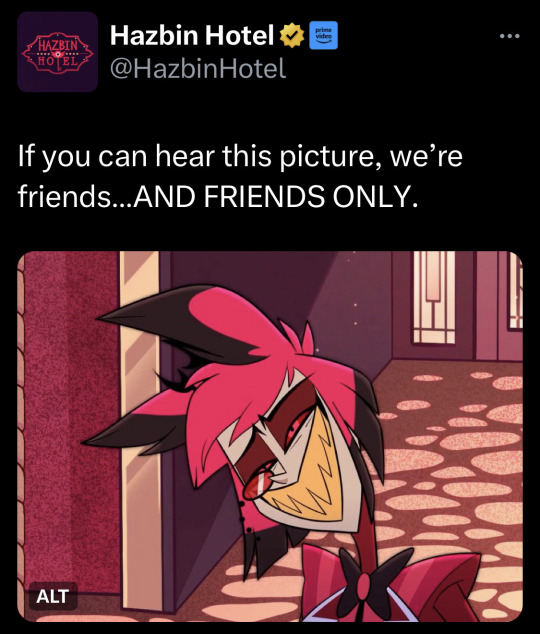
both of these are explicitly non-romantic. not just non-sexual, they are both jokes and comments about being aromantic, not asexual.
yes, rosie only mentions him being asexual in episode seven, but again, this is a joke made about the idea of him being in a ROMANTIC relationship. unless rosie was implying that she knows alastor and charlie wouldn’t fuck? which 😭😭 i don’t think she would do that??? it was definitely a joke about him not wanting romance because of his romantic and sexual orientation. and yes, i understand how annoying it is that asexuality and aromanticism are being used interchangeable in this instance, and this is an issue ace/aro people have been facing for years, but this is clearly a joke about him being aroace, not just ace.
again, you guys are giving alloromantic/allosexual people WAY too much credit on how much they know about ace/aro people, when most of their knowledge (if any) is “asexual people dont want sex, aromantic people don’t want romance” and that’s it. vivziepop, despite being queer herself, is still allo as far as im aware. allo people BARELY know anything about asexuality or aromanticism or care to learn the difference, and it’s clear that aro/aceness is being used interchangeably here. alastor is portrayed as aroace, and is clearly meant to be seen as aroace, even though he’s only ever been explicitly called ace by viv.
#this isnt even mentioning that his va called him aroace and viv never corrected him lol#(in front of her i might add)#hazbin hotel#hazbin hotel alastor#hazbin alastor#alastor the radio demon#asexual#aromantic#aroace#aroace alastor#aromantic alastor#asexual alastor#hazbin hotel meta#hazbin meta
680 notes
·
View notes
Text
Ok so
I have a thought
With hell "being a place where everything is allowed"
It would be actually a really nice twist if the real punishment of hell was to lose your humanity in the illusion of "free will and no punishment"
Which would set up Lucifer to be the villain (which is a big improvement for the character imo)
What if all the "pride ring" where the sinners are kept was designed to strip them of any remaining light?
Because Lucifer can't claim their souls otherwise
Because they *do* have hope
Because they *do* have chance for redemption
Because inside of every demon *is* a rainbow
Also
This would make Charlie being set up to fail
If we talk pilot! Charlie (don't bring the series Charlie to me I don't know this woman) - she's a genuine person who sees that sinners there have potential to do good
Because it's true
But she's deliberately discouraged by Lucifer because it goes against his interests
They are his property even if he can't get them *yet*
He's like a groomer who slowly breaks them down and cuts them off the "lifeline" until there's no escape route
And the hotel? With the bs therapy activities?
She was given fake tools that won't work to shut her up and stop her from digging
55 notes
·
View notes
Text
Paradise Lost: How John Milton's 1667 work influenced "Hazbin Hotel"
I've been thinking about why the "fruit of knowledge" in Hazbin Hotel is depicted as an apple, as opposed to another fruit that would've been more accurate to the Middle East during the Fall of Man, as well as how Paradise Lost by John Milton (1667) influenced the show.
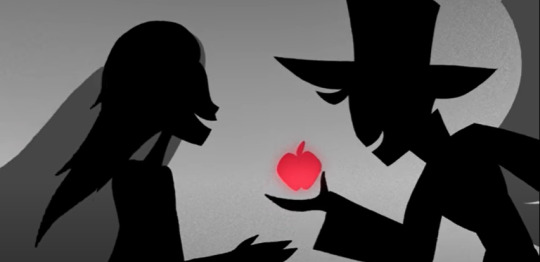
Per one source:
"Because the Hebrew Bible describes the forbidden fruit only as 'peri', the term for general fruit, no one knows [what exactly type of fruit it was]. It could be a fruit that doesn't exist anymore. Historians have speculated it may have been any one of these fruits: pomegranate, mango, fig, grapes, etrog or citron, carob, pear, quince, or mushroom."
Per Wikipedia:
"The pseudepigraphic Book of Enoch describes the tree of knowledge: 'It was like a species of the Tamarind tree, bearing fruit which resembled grapes extremely fine; and its fragrance extended to a considerable distance. I exclaimed, How beautiful is this tree, and how delightful is its appearance!' (1 Enoch 31:4)."
In Jewish and Islamic traditions, the "fruit of knowledge" is commonly identified with grapes. The Zohar explains that Noah attempted (but failed) to rectify the sin of Adam by using grape wine for holy purposes. Today, the "Noah grape" is still used to make white wine.

Furthermore:
"The association of the pomegranate with knowledge of the underworld as provided in the Ancient Greek legend of Hades and Persephone may also have given rise to an association with knowledge of the 'otherworld', tying-in with knowledge that is forbidden to mortals. It is also believed Hades offered Persephone a pomegranate to force her to stay with him in the underworld for 6 months of the year. Hades is the Greek god of the underworld, and the Bible states that whoever eats the forbidden fruit shall die."
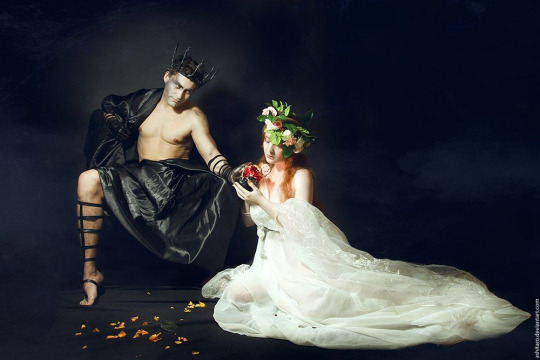
So, how then did the apple become the foremost symbol of the "fruit of knowledge"? You can partly thank Paradise Lost by English poet John Milton, a work which the lore of Hazbin Hotel is based off of.
Milton published the book in 1667, a time when the hedonistic Restoration era was in full swing. The exiled King Charles II was restored to the throne as King of England in 1660, and was a party animal, with dozens of mistresses, and nicknamed both the "playboy prince" and "Old Rowley", the latter after his favorite lustful stallion.
However, the association of the "fruit of knowledge" began with a Latin pun long before Milton immortalized the association in Paradise Lost. Per the linked article above by Nina Martyris for NPR:
"In order to explain, we have to go all the way back to the fourth century A.D., when Pope Damasus ordered his leading scholar of scripture, Jerome, to translate the Hebrew Bible into Latin. Jerome's path-breaking, 15-year project, which resulted in the canonical 'Vulgate', used the Latin spoken by the common man. As it turned out, the Latin words for evil and apple are the same: 'malus'.
[...] When Jerome was translating the 'Tree of the Knowledge of Good and Evil', the word 'malus' snaked in. A brilliant but controversial theologian, Jerome was known for his hot temper, but he obviously also had a rather cool sense of humor.
'Jerome had several options,' says Robert Appelbaum, a professor of English literature at Sweden's Uppsala University. 'But he hit upon the idea of translating 'peri' as 'malus', which in Latin has two very different meanings. As an adjective, 'malus' means 'bad' or 'evil'. As a noun it seems to mean an apple, in our own sense of the word, coming from the very common tree now known officially as the 'Malus pumila'. So Jerome came up with a very good pun.'
The story doesn't end there. 'To complicate things even more,' says Appelbaum, 'the word 'malus' in Jerome's time, and for a long time after, could refer to any fleshy seed-bearing fruit. A pear was a kind of 'malus'. So was the fig, the peach, and so forth.'
Which explains why Michelangelo's Sistine Chapel fresco features a serpent coiled around a fig tree. But the apple began to dominate Fall artworks in Europe after the German artist Albrecht Dürer's famous 1504 engraving depicted the First Couple counterpoised beside an apple tree. It became a template for future artists such as Lucas Cranach the Elder, whose luminous Adam and Eve painting is hung with apples that glow like rubies.
Milton, then, was only following cultural tradition. But he was a renowned Cambridge intellectual fluent in Latin, Greek and Hebrew, who served as secretary for foreign tongues to Oliver Cromwell during the Commonwealth. If anyone was aware of the 'malus' pun, it would be him, and yet he chose to run it with it. Why?
Appelbaum says that Milton's use of the term 'apple' was ambiguous. 'Even in Milton's time the word had two meanings: either what was our common apple, or, again, any fleshy seed-bearing fruit. Milton probably had in mind an ambiguously named object with a variety of connotations as well as denotations, most but not all of them associating the idea of the apple with a kind of innocence, though also with a kind of intoxication, since hard apple cider was a common English drink.'
It was only later readers of Milton, says Appelbaum, who thought of 'apple' as 'apple', and not any seed-bearing fruit. For them, the forbidden fruit became synonymous with the 'malus pumila'. As a widely read canonical work, 'Paradise Lost' was influential in cementing the role of apple in the Fall of Man story."
To tie this back into John Milton's relationship with King Charles II of England, as mentioned, Milton originally served Oliver Cromwell, Lord Protector of England, and the English Commonwealth, which was formed with the overthrow and execution of King Charles I on 30 January 1649, following the bloody English Civil War (1642 – 1651).
The King's two sons - the newly-christened King Charles II, the elder, and James, Duke of York (King James II), the younger - fled into exile on the European continent. However, with the death of Oliver Cromwell on 3 September 1658 came the 2-year-long dissolution of the English Commonwealth, and the restoration of the monarchy.
As for Milton himself, we can look to an article by Bill Potter.
Milton, born on 9 December 1608, was around 51-52 years old when King Charles II was restored to the throne. He attended Christ's Church, Cambridge in his youth, and mastered at least six languages, as well as history and philosophy; making him, perhaps, the most knowledgeable poet in history. He spent more than a year travelling across Europe, conversing with and learning from intellectuals, linguists, poets, and artists, including the famous Galileo Galilei.
However, Milton was a controversial figure of his time, being unafraid to criticize institutions of authority; arguing that "divorce was Biblical", for which he was routinely condemned; joining the Puritans; penning the Areopagitica, a treatise on liberty in favor of Parliament and the Roundhead rebels, during the reign of King Charles I, arguing that the King must be held accountable by the people; and agreed with and justified the murder of King Charles I, for which Parliament hired him in 1649 as a propagandist and correspondence secretary to foreign powers, on account of his fiery manifestos against "the man".
The collapse of the Commonwealth with the death of Oliver Cromwell in 1658 did not deter Milton from continued political writing against the monarchy and the new public sentiment that brought about its Restoration under King Charles II in 1660. On the contrary, Milton - now totally blind, having lost his eyesight by the age of 44 in 1652, a decade earlier - began writing Paradise Lost in 1661, and spent the next six years dictating the work to transcribers.
A supporter of regicide, Milton was also forced into exile himself, and faked his own death, as Charles refused to pardon - and sought to execute - any of those directly involved with his father's murder. Milton's friends held a mock funeral for Milton on 27 August 1660, just months after the coronation of King Charles II on 23 April 1660.
King Charles II commented that he "applauded his [Milton's] policy in escaping the punishment of death [execution for treason] by a reasonable show of dying", but insisted on a public spectacle nonetheless by having Milton's writings burned by the public hangman.
After eventually obtaining a general pardon from King Charles II, Milton was imprisoned, and released, likely due to political friends in high places. He died, aged 64, in 1674. His theological views were sometimes considered heterodox by the best Puritans, and his political views came close to getting him executed on several occasions. His poetry, however, has endured as some of the greatest works in the English language, especially Paradise Lost; much of his greatest work was written during his 22 years of complete blindness.
One of the main factors in King Charles II deciding to grant a pardon to Milton was, ironically, Paradise Lost. While originally written by Milton as a scathing criticism of King Charles II and the monarchy - depicting Lucifer Morningstar as a sympathetic rebel against God, with King Charles II claiming that is right to rule came from "divine ordainment" - Charles II enjoyed the work, and authorized its publication on 20 August 1667. We know this because a 1668 copy of Paradise Lost in royal bindings by Samuel Mearne, bound lovingly in a fine red leather made of goat skins tanned with sumac, and stamped in gold with the royal cypher of King Charles II, was found. The endpapers bore a watermark with the royal arms of Charles II.
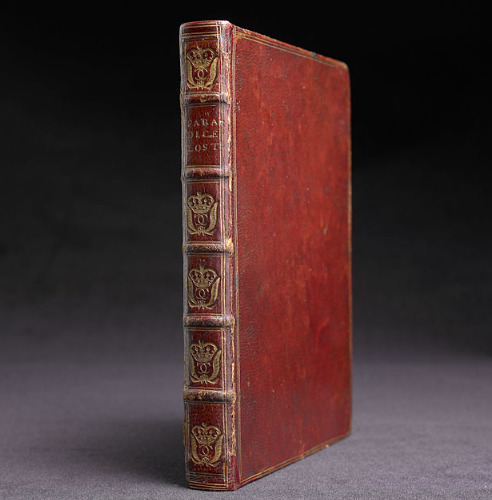
Per one Miltonian scholar: "The most single important event in Milton's life was the event against which he struggled most: the Restoration of Charles II, [and his relationship with the King]. Had it not come, we might have never had Paradise Lost...certainly, we should never have had [it] in [its] present power and significance."
Milton followed up Paradise Lost with Paradise Regained in 1671, three years before his death, with advice for King Charles II, urging the hedonistic Charles to "reign over himself and his passions":
"For therein stands the office of a King, His Honour, Vertue, Merit and chief Praise, That for the Publick all this weight he bears. Yet he who reigns within himself, and rules Passions, Desires, and Fears, is more a King; Which every wise and vertuous man attains: And who attains not, ill aspires to rule Cities of men, or head-strong Multitudes, Subject himself to Anarchy within, Or lawless passions in him which he serves." - John Milton, Paradise Regained, Book II, lines 463-472
To summarize: "If we must have a King back again, my Lord, please try to be a good man, unlike your father, who fell to his pride, [which was also the downfall of Lucifer]."
To quote another source: "Though the passage begins by noting that the office of a King is to bear the weight of public concerns, it is the control of one's private concerns that truly set a King apart as a virtuous character. Indeed, so important is self-command that any wise or virtuous man who attains it is like a king; any king who does not practice [self-command] is nothing more than a mere subject, ruled by anarchy and lawlessness."
Milton's words, too, echo a work written by Charles' grandfather, King James VI/I of Scotland and England: Basilikon Doron ("Royal Gift").
Per Wikipedia:
"'Basilikon Doron' (Βασιλικὸν Δῶρον) means 'royal gift' in Ancient Greek, and was written in the form of a private letter to James' eldest son, Henry, Duke of Rothesay (1594–1612). After Henry's death, James gave it to his second son, Charles, born 1600, later King Charles I. Seven copies were printed in Edinburgh in 1599, and it was republished in London in 1603, when it sold in the thousands.
This document is separated into three books, serving as general guidelines to follow to be an efficient monarch. The first describes a king's duty towards God as a Christian. The second focuses on the roles and responsibilities in office. The third concerns proper behaviour in daily life.
As the first part is concerned with being a good Christian, James instructed his son to love and respect God as well as to fear Him. Furthermore, it is essential to carefully study the Scripture (the Bible) and especially specific books in both the Old and New Testaments. Lastly, he must pray often and always be thankful for what God has given him.
In the second book, James encouraged his son to be a good king, as opposed to a tyrant, by establishing and executing laws as well as governing with justice and equality, such as by boosting the economy. The final portion of the Basilikon Doron focuses on the daily life of a monarch.
All of these guidelines composed an underlying code of conduct to be followed by all monarchs and heads of state to rule and govern efficiently. James assembled these directions as a result of his own experience and upbringing. He, therefore, offered the 'Basilikon Doron' ('Royal Gift') to his son, with the hope of rendering him a capable ruler, and perhaps to pass it down to future generations.
Overall, it repeats the argument for the divine right of kings, as set out in 'The True Law of Free Monarchies', which was also written by James. It warns against 'Papists' (Roman Catholics) and derides Puritans, in keeping with his philosophy of following a 'middle path', which is also reflected in the preface to the 1611 King James Bible. It also advocates removing the Apocrypha from the Bible."
King James VI/I further instructed his son and grandson:
"A good monarch must be well acquainted with his subjects, and so it would be wise to visit each of the kingdoms every three years."
"During war or armed conflict, he should choose old-but-good captains to lead an army of young and agile soldiers."
"In the court and the household, [a royal] should carefully select loyal gentlemen and servants to surround him. When the time came to choose a wife, it would be best if she were of the same religion and had a generous estate. However, she must not meddle with governmental politics, but perform her domestic duties."
"As for inheritance, to ensure stability, the kingdom should be left to the eldest son, not divided among all children."
"Lastly, it is most important...that [a royal] would know well his own craft...to properly govern over his subjects. To do so, [one] must study the laws of the kingdom, and actively participate in the council. Furthermore, [one] must be acquainted with mathematics for military purposes, and world history for foreign policy."
"[A royal] must also not drink and sleep excessively. His wardrobe should always be clean and proper, and he must never let his hair and nails grow long. In his writing and speech, he should use honest and plain language."
King James VI/I further supplemented Basilikon Doron with a written treatise titled The True Law of Free Monarchies: Or, The Reciprocal and Mutual Duty Between a Free King and His Natural Subjects.
"It is believed King James VI/I wrote the tract to set forth his idea of absolutist monarchism in clear contrast to the contractarian views espoused by, among others, James' tutor George Buchanan (in 'De Jure Regni apud Scotos'), [which] held the idea that monarchs rule in accordance of some sort of social contract with their people. James saw the divine right of kings as an extension of the apostolic succession, as both not being subjected by humanly laws."
Milton's own Areopagitica was a follow-up on De Jure Regni apid Scotos by George Buchanan, and also to The True Law of Free Monarchies, as well as the idea of the "divine right of kings". It takes its title in part from Areopagitikos (Greek: Ἀρεοπαγιτικός), a speech written by Athenian orator Isocrates in the 4th century BC.
Most importantly, Milton also wrote on the concept of free will: "Milton's ideas were ahead of his time in the sense that he anticipated the arguments of later advocates of freedom of the press by relating the concept of free will, and choice to individual expression and right."
The concept of free will, too, was a major topic explored in Paradise Lost. Per one source: "In 'Paradise Lost', Milton argues that though God foresaw the Fall of Man, he still didn't influence Adam and Eve's free will. [...] God specifically says that he gives his creatures the option to serve or disobey, as he wants obedience that is freely given [or chosen], not forced. Some critics have claimed that the God of the poem undercuts his own arguments; however, Milton did not believe in the Calvinistic idea of 'predestination' (that God has already decided who is going to Hell and who to Heaven), but he often comes close to describing a Calvinistic God. God purposefully lets Lucifer (Satan) escape Hell, and sneak past Uriel into the Garden of Eden, and basically orchestrates the whole situation so that humanity can be easily ruined by a single disobedient act. In describing the Fall of Man before it happens, God already predicts how he will remedy it, and give greater glory to himself by sending his Son [Jesus Christ] to die, and restore the order of Heaven."
In Hazbin Hotel, Adam also describes the Calvinistic idea of 'predestination', and that "the rules are black and white":

However, "This possible predestination leads to the theory of the 'fortunate fall', which is based on Adam's delight at learning of the eventual coming of the Messiah [from his bloodline]. This idea says that God allowed the Fall of Man, so that he could bring good out of it, possibly more good than would have occurred without the Fall, and be able to show his love and power through the incarnation of his Son. In this way, the free will of Adam and Eve (and Lucifer/Satan) remains basically free, but still fits into God's overarching plan."
However, there is one major flaw with this, and that is that we don't know if Jesus Christ exists within the Hazbin Hotel universe or not. Yet Charlie Morningstar, the daughter of Lucifer Morningstar and Lilith, and the "Princess of Hell", is depicted as a savior-esque figure within the show who, like God in Paradise Lost, encourages lowly sinners to choose obedience to God out of their own free will. More interestingly, Charlie does not come from Adam's bloodline; yet, while Lucifer decries 'free will', Charlie supports 'free will' instead.
Perhaps is is merely because Charlie, being the daughter of Lucifer and Lilith, claims to want to fulfill Lilith's "dream" of humanity being empowered in Hell ("The mind is its own place, it can make Heaven out of Hell, or Hell out of Heaven" - Lucifer, Paradise Lost); however, I think it also stems from Charlie having a genuine belief that 'free will', and people choosing to do good instead of evil, is "good" and "Godly".
True to Paradise Lost, this is also in fulfillment of God's plan; and, according to one fanfiction, why God allowed Charlie to be born to Lucifer and Lilith, so that sinners may be redeemed through Charlie.
For more on differing interpretations of 'free will', I suggest reading: "Free Will and the Diminishing Importance of God's Will: A Study of Paradise Lost and Supernatural" by Kimberly Batchelor (2016)
Excerpt: "'Paradise Lost' –and Milton’s purpose for writing the poem— is rooted deeply in postreformation Arminianism and this is apparent in its employment of free will. Chapter 1 argues that Milton turns to free will as a tool to justify the actions of God. Freedom of choice is God-given, and sets up a morality in which right and wrong are dictated by God. Chapter 2 shows that in 'Supernatural', free will is not given by a higher power; and, in fact, free choice functions as an act of defiance against God's will."
This raises the question: Is 'free will' given by God, using Lucifer as his vessel, in Hazbin Hotel, as in Paradise Lost? Or is 'free will' not given by a higher power; and, in fact, an act of defiance against God?
This brings us back around to our first question: Why is an apple, or 'malus', used to depict the "fruit of knowledge", especially if 'malus' means 'bad or evil', whereas Milton depicts 'free will' as God-given?
Well, for one, Lucifer still chooses to associate himself with apple symbolism and imagery, despite being skeptical of free will:
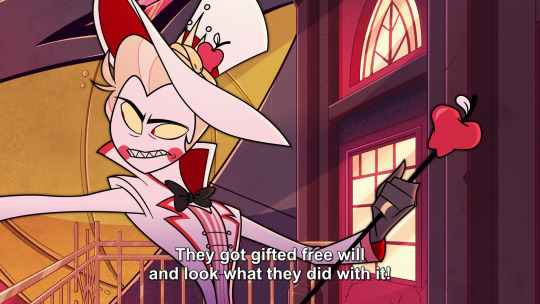
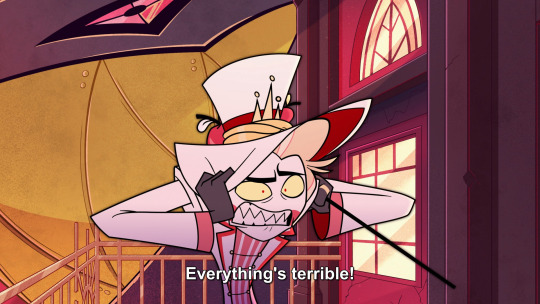
Based on the introduction to Episode 1, Charlie also views 'free will' as a gift (Miltonian), whereas Lucifer appears to view it as a curse.
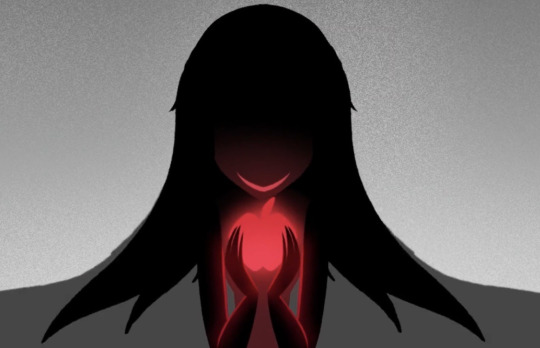
However, Charlie also notes that it was through the 'gift' of free will that the "root of all evil" entered the world, for if mankind could choose to be good, then they could also choose to be evil ('malus').
John Milton states in Paradise Lost: "Of Man's First Disobedience, and the Fruit Of that Forbidden Tree [malus], whose mortal taste Brought Death (evil, malus) into the World, and all our woe."
Thus, the use of an apple specifically is likely a tie-in to what others have been speculating about a character that series creator Vivienne Medrano (Vivziepop) alluded to a while back: "The Root of All Evil".
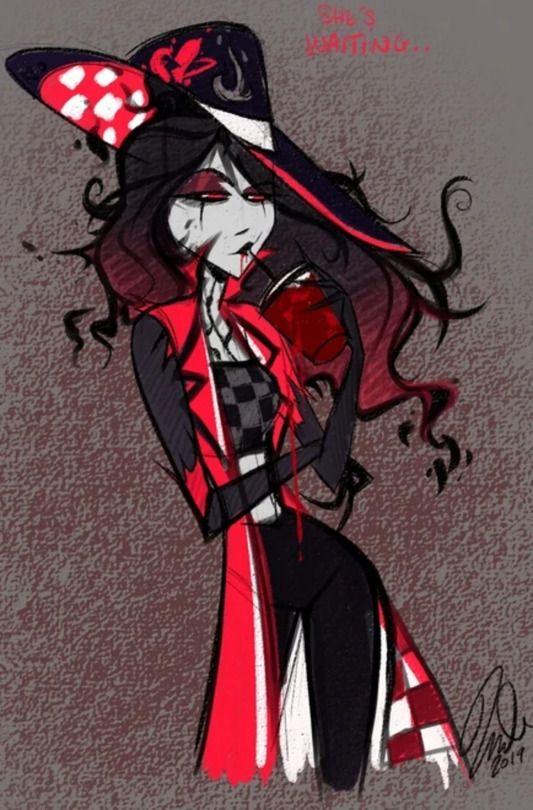
However, "Roo" itself is depicted as possessing the body of a human woman, presumably Eve, the first one to eat the "fruit of knowledge":
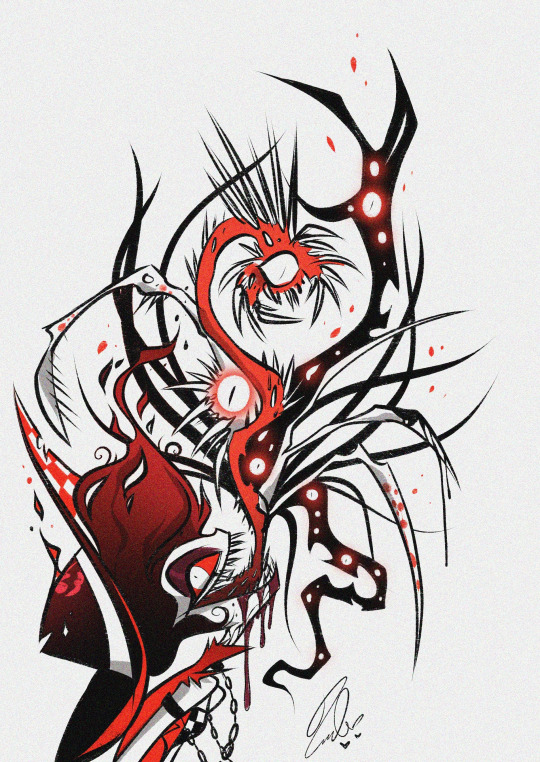
Thus, we can discern that "Malus" likely refers to this character. (Also see: "Maleficent", a name that also uses the root word "mal", "evil".) As for Roo's intentions, if Charlie is "good" - and, if, in fact, Alastor was sent by "Roo" (Eve) - then they may want for Alastor to work on their behalf to "corrupt" Charlie, or make sure the hotel never succeeds.
This is because demonic power is tied to human souls, and there are "millions of souls" in Hell, which likely fuels the great power of "Roo". The more souls there are in Hell, the more powerful "Roo" becomes. The Overlords also get their demonic power from "millions of souls".
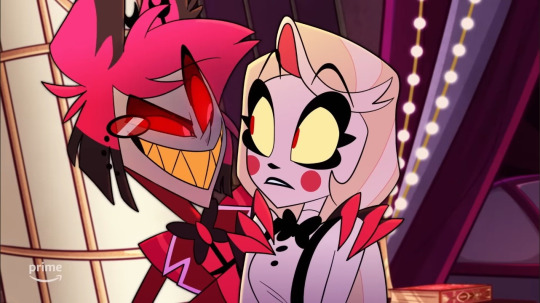
The deal between Eve and "Roo" might even be the first contract, or deal, between a human soul and a demonic entity; in exchange for 'free will', and the knowledge of good and evil, Eve allowed the "Root of All Evil" to inhabit her body, and to escape the void or prison it was confined to by Heaven (Hell?). (For one cannot be 'all-good' unless you attempt to 'eliminate' or 'ablate' evil; and, in Greek mythology, Zeus imprisoned the Titans in Tartarus for all of their evil deeds.)
Another possibility, brought up in an article by Gillian Osborne, is that Lucifer sees the "fruit of knowledge" as an apple, but it may appear as different fruits to different people, depending on how they view it. This also fits with Lucifer and angels being able to easily shapeshift.
In Paradise Lost, only Lucifer describes the fruit as an "apple" (malus), as he associates malus with "bad, evil", while the narrator also describes the fruit as "a mix of different colors" and peach-like. This then begs the question: "Did the fruit of knowledge of good and evil become 'evil' because Eve harbored resentment towards Adam?"
Quote: "Lucifer (Satan) gives Eve yet another hint that this tree may be more complicated than he wishes her to believe: although elsewhere in Milton's poem Eden is heady with its own newness, sprouting spring flowers left and right, the tree of knowledge is already old: its trunk is 'mossie'. Nevertheless, Lucifer claims to wind himself around the tree 'soon'; the quickness of his reported arrival stands in contrast to the timescales required to cover a fruit tree with moss (PL 9.589). Placing Lucifer's winding body between these two timescales—an easeful present and the inhuman scale of natural history—Milton suggests that there is something dangerous in entangling the past with the present. Yet, 'Paradise Lost' also makes deep biblical history feel like present politics for its readers. When Adam and Eve wander out of Eden at the end of the poem, they famously make their way not only into an earthly paradise, but also into the present. Eden's mossy apple tree therefore represents the pitfalls of conflating nature and history, of seeing any action in human history—even Eve's eating of an apple—as natural, if by nature, we mean inevitability. For Milton, history, unlike nature, is directed by humans, progressive, and, like the reading of 'Paradise Lost', hard work. While trees may inevitably collect moss the longer they live, Adam and Eve's labors in the garden, and our labors of reading, require agency and effort. Milton's poem refuses mourning the loss of Eden, [and the perfection of Heaven], in favor of a perpetual, melancholic, recreation of paradise: a present perfecting."
To quote Twisted: The Untold Story of a Royal Vizier, which also draws inspiration from John Milton's Paradise Lost: "It's an unfortunate situation...but you do have a choice [i.e. free will]."
#hazbin hotel#hazbin hotel analysis#hazbin#hazbin analysis#hazbin hotel meta#hazbin meta#hazbin hotel theory#hazbin theory#deep thoughts#john milton#paradise lost#eve hazbin hotel#lucifer hazbin hotel#lucifer morningstar#adam hazbin hotel#lilith hazbin hotel#lilith morningstar#roo hazbin hotel#root of all evil
262 notes
·
View notes
Text
Episode 4 of Hazbin is quite literally the best episode so far. It doesn't suffer from the vivzieisms that the first three episodes did and fundamentally told a better story about an SA and abuse survivor than I've seen in a long time, speaking from being an SA survivor. Angel being an unperfect and sometimes downright awful person with how he acts around people is really important to portray. When people always see perfect victims, they then like to dismiss victims who are assholes. NEWSFLASH!!! Many victims suffer negatively to their social skills when they are being abused!
Especially with Angel's hypersexual demeanor to everyone, I find it so refreshing how he even sees the need to be desired by everyone as crucial while also hoping that they reject him the same time. He feels the need to be the person that he pretends to be in all his videos because then he is desired by people; wanted. But he hates being Valentino's favorite toy. He needs to be wanted, but hates hates the biggest source of it, since it is the source of his abuse.
#hazbin#hazbin hotel#angel dust#helluva boss#hazbin meta#hazbin hotel angel dust#hazbin hotel meta#hazbin analysis#hazbin hotel analysis#character analysis#angel dust analysis#vivziepop#vivzieverse
204 notes
·
View notes
Text
The thing with Alastor is that I think he genuinely does like people. I don't think he cares too much about many individual persons, but when it comes to people as a collective he likes and wants to be liked back.
You don't go into entertainment if you don't want some kind of validation from it, and Alastor got so into radio in life that his soul was moulded around it in death.
And that's fundamentally the source of a lot of the conflict in his character.
Alastor wants to be the feared and hated Radio Demon. But he also wants to be ‘Al, that charming guy from the radio!’
Alastor wants to be treated with respect and terror at all times. But he also wants to have fun and joke around with people.
Alastor wants to keep the reasons for his disappearance a deadly secret. But he also wants to go to the Overlord meeting and have everyone dying to know where he was and what he was doing.
(“And when Alastor's not in the scene, all the other characters should be standing around like ‘hey, where's Alastor?’!”)
This is why Husk, up until he touches that particular sore spot, gets away with so much more in his relationship with Alastor than, say, Angel gets with Valentino.
Val wants Angel to be a tool or a toy he can control. Alastor kind of wants the same from Husk, but he also wants to be able to play the role of the cheeky but charming boss who can talk Husk around with a wink and a bottle of cheap booze.
(A role that Husk, for his part, goes along with because it allows him to keep some of his dignity. He gets to snark at Alastor and act like he still has even the slightest control over his own destiny. Alastor gets to laugh it off and act like he's a good employer. They both know it's a lie, but Husk clings to it because the alternative is even more humiliation, and Alastor finds it too much fun to give up.)
This is also I think the real reason he and Rosie are such good friends. Because Rosie is also 100% playacting.
Cannibal Town is a fucking dangerous place. Given that Charlie considered the “sights to see en route to my hotel” a selling point for joining her army (a hotel in walking distance) I'm guessing there are some restrictions preventing the residents from leaving. People eat corpses in the streets.
Rosie is clearly a fearsome and vicious Overlord in her own right. Even Lucifer's daughter is twitchy around Cannibal Town.
But, at the same time, when the streets aren't covered in blood and viscera, they're gleaming. The people are all well dressed. There are quaint little shops. Everyone is smiling, all the time.
It's clearly a stage play, but it's one that Rosie and the residents seem to enjoy acting out, and one that they let Alastor have a role in when he visits. In Cannibal Town, Alastor gets to be the charming young man about town whose smile brightens up the place and who everybody (except, ugh, Susan) is pals with.
And I think it's this conflict of personas that is ultimately going to be the biggest factor in whether Alastor ends up being a hero or a villain on the show.
Cause like, Alastor the altruist is obviously an act. But, so is the Radio Demon.
Alastor isn't an all powerful killing machine. In most of the scenes he's in, he's not even the most powerful person in the room. (Albeit
primarily because he's usually accompanied by Charlie.) And he's not acting purely on his own whims, he's on someone else's leash.
I don't think Alastor is necessarily capable of feeling remorse for the stuff he's done in the past. Or caring about other people more than he does himself. It's just not his character.
But I think he is capable, given time to get attached and a lot of positive reinforcement, of deciding that playing 'steadfast hotelier' for Charlie and co is more fun than playing the evil Radio Demon for everyone else.
Picking other people over himself is probably not something that's going to happen for Alastor any time soon. But picking one persona over the other? That I could see.
#alastor#the radio demon#hazbin hotel#hazbin meta#hazbin headcanons#charlie morningstar#hazbin hotel rosie#hazbin hotel husk#alastor hazbin hotel
136 notes
·
View notes
Text
✧ THEORY: ON ABEL & ADAM'S FAVORITISM ✧

⚠️ Spoiler Warning: This post contains confirmed canon information from Hazbin Hotel S1, as well as discussion of leaks & narrative implications that may hint at future plot developments. Proceed with caution if you’re avoiding spoilers or unreleased material. Please keep in mind this is all speculative <3
In a nutshell, here is what I’m arguing: Abel is not Adam’s biological son, & his existence reframes everything we understand about Adam’s legacy. If Abel came from Eve & Lucifer, then Adam’s claim to moral authority collapses. Sin came from his line.
It’s been confirmed that Abel was not Adam’s favorite son... that he’s nothing like him, he’s pleasant & ‘is his own rockstar’. In the leaked episode, we see that he’s also soft-spoken, polite, & generally more joyful. In contrast, Adam is a narcissist: vulgar, sexist, fanatical, disgusted by sinners, & fully willing to kill them for sport. He displays a restrained yet persistent fixation on punishment [ I say restrained because I don’t feel he’s as obsessed compared to Lute. ] He doesn’t merely fight sinners: he enjoys it, & he makes that clear to Charlie in S1E1 [ “And for those of us with divine ordainment, Extermination is entertainment!” ].
In the same [ leaked ] episode, Abel shows very little concern over his father’s death. He acknowledges it, makes a cross gesture, & says “Rest in Peace” during Sir Pentious’s trial, but… that’s about it. In contrast, Lute is visibly shaken & furious. Adam’s death is clearly destroying her both mentally & emotionally. When she snaps, “Adam never even fucking liked you!” Abel simply agrees, saying “I know 🥺” before quickly redirecting the conversation to Sir Pentious, showing more interest in how a sinner was redeemed than in processing the loss of his father. Later, he even joins in singing with Emily & Saint Peter during Sir Pentious’s introduction to Heaven, behaving as if nothing is wrong. This boy gives no care about his father's death [ in my opinion ]
It’s worth noting that Abel is formally named the new commander of the Exorcists [ effectively demoting Lute. A decision made by both Emily & Sera since he is seen as more fair, ] & he seems just a little smug when confirming this to her. [ There’s also a brief, strange smirk before he departs, which might support the circulating rumor that he’s “a little shit,” but more on that another time. ] Later, he casually asks for one of Adam’s guitars “to remember him by,” but the tone is so nonchalant, calm & even pleasant, like Adam’s death wasn’t something that affected him in the slightest. [ Lute screams at him to leave, which he does. She performs her song, & when she looks toward the door, she catches Abel watching who looks shocked, likely because, from his perspective, she’s destroyed Adam’s office like a crazy person while singing along with a hallucination. ]
Despite the fact that we don’t have the real Adam around [ seemingly, ] we can tell by Abel’s behavior & general attitude that their relationship was strained to some degree. There’s no grief, mourning or reverence. When he agrees that Adam never liked him, there’s no bitterness either. It feels like he accepted long ago that he was never truly wanted, & now that Adam’s gone, he’s simply moving on, maybe even relieved. He doesn’t carry Adam’s wrath, fire, or ideological rigidity. There’s irony in that: the new leader of the Exorcists doesn’t care about punishment or vengeance. When Sera asks how Heaven should respond to Hell, Abel says: “I don’t much like confrontation, so I don’t love the idea of going down for revenge or anything… buuut they did sorta kinda kill my dad a little bit so… maybe? I’m pretty okay with either option to be honest.” Lute’s hallucination of Adam reinforces the point: “I never liked that kid,” before calling Abel a “major pussy.”
One theory suggests that Abel is the product of Eve & Lucifer. There are religious texts & interpretations, particularly in some strands of Jewish mysticism & early Christian apocrypha, that suggest Eve slept with the serpent [ Satan ]. In some readings of the Zohar & Talmudic Midrashim, the serpent isn’t just a deceiver, he’s a sexual tempter, implying Cain [ or by extension, Abel ] may have been fathered by a corrupting, external force. Notice the ‘eating out gesture’ Lucifer makes when referencing Lilith… but when it comes to Eve, he switches to the other gesture & that’s when Adam gets really mad. Lucifer is often not given enough credit, in my opinion. Yes, he’s nicer, he’s trying to be a good father to Charlie, & he’s painted as good, kind, & “misunderstood”… but he’s still the literal devil. Fandom often prefers to uphold the previously established dynamic between him & Lilith [ that they’re like Morticia & Gomez, that he’s only ever fallen for her & wouldn’t cheat on her — which, he didn’t have to in order to sleep with Eve, but I digress... ] & that’s exactly why many dismiss the idea that he would ever sleep with Eve in the first place. But I don’t personally believe that gesture was truly random or simply a provocation for its own sake. Perhaps Lucifer is implying something Adam refuses to acknowledge. He hit a sore spot, & I don’t think he’s referring to the fruit.
Another popular theory is that Adam didn’t eat the fruit [ “I’ve never made a mistake in my fucking life!” ] But if that statement is just an attempt to paint himself as untouchable & unfallen, then his hatred of sinners may stem from personal failure. The first true sinner after Eve wasn’t an outsider; it was Cain, a child from his bloodline, & if Abel was indeed not his child, then Abel’s existence becomes more than a disappointment, it becomes a direct challenge to Adam’s authority over creation, legacy & spiritual purity. In that context, Adam doesn’t hate sinners simply because they defy Heaven; he hates them because they reflect his inability to enforce control. They remind him that sin began inside his own house.
Abel being Lucifer’s son reframes everything. Adam was never the sole architect of mankind, nor the moral gatekeeper he claims to be. The order he fought to preserve was already fractured. There’s a reason he calls Charlie & her group, “You ungrateful, disgusting, fucking LOSERS!” with such vitriol, such hate & disgust. That wasn’t just him lashing out in the moment; it was absolutely personal & full of genuine contempt. It also exposes a contradiction: if Adam truly despises sin, if his hatred for impurity is so absolute, then why would he favor Cain, the first true sinner after Eve, over Abel, who was pleasant, joyful, & seemingly harmless? Unless what truly enrages him is the fact that sin came from his bloodline, while that true / genuine goodness Abel possesses may have come from Lucifer, who he calls “the most hated in all of creation!” While mankind, which he furiously reminds everyone “came from these fucking nuts!” turned out disgusting, sinful, & imperfect.
Abel is the reminder that Adam may have been the beginning, but he was never meant to be the blueprint. Why did Adam reject him? Why would a man obsessed with purity favor a murderer over the brother who did nothing wrong? Why would he call Abel a coward, when he was the one murdered by a sinner? Maybe Adam didn’t reject Abel because he was weak. Maybe he rejected him because he wasn’t his. He claims dominion over all of humanity, yet speaks of it with nothing but contempt. Maybe he never had control. Maybe that’s why he’s so desperate to erase the reminder [ sinners, ] & why Exterminations are “fun” for him.
To recap: Abel is confirmed to be nothing like Adam — he’s calm, soft-spoken, pleasant & generally uninterested in punishment. He doesn’t inherit his father’s wrath or fixation on judgment. If Abel isn’t biologically Adam’s son, it implies that sin, violence, & control may be tied to Adam’s bloodline, while empathy, grace, & the capacity for redemption could stem from an outside force, potentially Lucifer. Maybe that’s part of why Adam never accepted him: not necessarily because he was weak, but because he was never his.
#theories.#txts.#tw leaks#tw spoilers#abel hazbin hotel#lucifer hazbin hotel#adam hazbin hotel#hazbin spoilers#hazbin hotel#hellaverse#hazbin hotel theory#hazbin lore#hazbin meta#hellaverse theory#hazbin hotel spoilers#hazbin analysis#hazbin hotel thoughts#hazbin hotel speculation#hazbin fan theory#hazbin deep dive#hazbin hotel Abel#lilith hazbin hotel#hazbin hotel Adam#hazbin hotel lucifer#hazbin hotel adam#roo hazbin hotel#hazbin hotel leaks#hazbin hotel abel#hazbin hotel eve#adam post
8 notes
·
View notes
Text
Adam's return
I would absolutely love if Adam came back as a demon and became a permanent resident of the hotel, one because it would be hilarious to see his dynamic with the main cast, specifically Alastor, Lucifer and Nifty. But also because I believe it would be incredibly thematically appropriate considering the theme of the show is redemption, and sadly because the show was given so few episodes I don't believe it had enough time to dig into the rehabilitation of the residents whilst also trying to establish the world and get us invested.
Which is why I hope with the next season with all the establishing out of the way we can truly focus more on the main premise of the show. Which leads into why I think it would be great if Adam became a resident because it would really challenge Charlie on what redemption means and if anyone can really change, even someone as vile as Adam. It would also be fascinating to see Adam come to grips with the fact that he was cast out of heaven and the only one he can blame is himself, and whilst I fully believe he would be in denial of his faults at the beginning it would be fun to see him be brought back down to reality and face the truth of who he has really become.
However, just because I want to explore what it would be like for Adam to go on the path to redemption that doesn't mean I actually want to see him reach heaven. Instead I would like it if they use his character to explore the concept of only doing good thing's for a perceived reword at the end and how you can instead find comfort of becoming a better person even if you are never fully forgiven by the people you hurt. Perhaps, by the end of the show Adam has stopped being a resident of the hotel and instead one of the employees working to make hell a better place to live in for all, I think that would be a nice end to his character.
Plus there's also his relationship with Lute which would be completely upheaved if the creators went with this route, since Lute has made it very clear that she believes sinners and by extension redemption to be an abomination, so it's would be fascinating to see her react to her boss and someone she was clearly devoted to become one of these demons and not only that but he has taken haven in the very place they both tried to destroy. Now that! is interesting and I would love to see how that would play out, even more if Adam gets to experience first hand what it's like to be hunted by an exorcist.
However, that being said I am also perfectly fine with him staying dead as Hazbin already has a ton of characters and since we don't know if the next season will get more episodes it would probably be for the best to focus on developing the main characters an not focus on any unnecessary material.
But hey that's just my thoughts.

#hazbin hotel#hazbin spoilers#hazbin adam#hazbin hotel adam#hazbin theory#hazbin hotel theory#hazbin alastor#hazbin hotel alastor#hazbin lucifer#character analysis#hazbin meta#meta analysis#hazbin hotel season 1
106 notes
·
View notes
Text
Favorite aspect of Alastor revealed in the show has gotta be that he loves being the center of attention. He's said to be an enigma, yet he thrives on people being curious about him. He wants to know what people think of his deal with Charlie. He wants people to wonder why he has been missing for seven years. And the majority of the few times we see his smile grow tense is when his mystery is disregarded.
Which explains why he enjoys his rivalry with Vox. Vox's obsession is a reliable source of attention for him. No matter what Alastor does, Vox will be there trying to undermine him. And watching him try is a dual source of enjoyment: it is fun to see his enemy stumble and glitch in frustration, but damn does Alastor also enjoy being in the spotlight, even if in the mind of just one person.
6K notes
·
View notes
Text
He looks so terrified and panicked here...
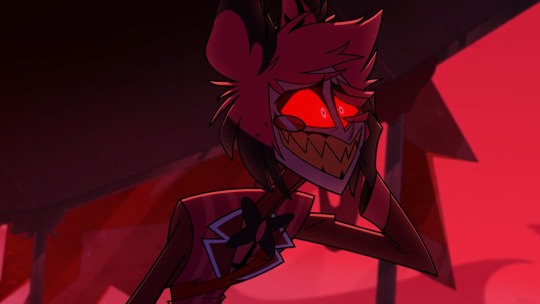

Can't help but feel for him. It seems like he is having an anxiety attack about two things at once: about how close he was to death (and probably at how weakened he is by that deal he made) and at the same time by the feelings he seems to have for the Hazbin residents.
I think that even thought the line he had about "altruist who almost died for his friends" was meant to be mocking and the narrative of how the others would see it if he died there, there was still some genuine fear from Alastor there about how close to the truth that sentence was.
Like I know this man is manipulating the shit out of everyone around him but i still believe that he somewhat cares for the Hazbin residents, even if it has a lot to do with him seeing them through the lens of how much he can gain from them and how he can use them.
Its like he doesn't want the fact that he cares about them to be something true, especially with the dialogue we got between him and Niffty at the beginning of episode 8 and how much fun he's been having.
In the end, I think he got comfortable and used to the Hazbin Hotel and his role in it all. And I think that scares the shit out of him.
#hazbin hotel#hazbin hotel spoilers#hazbin hotel season 1#hazbin alastor#hazbin meta#hazbin thoughts#gin posts hazbin hotel
60 notes
·
View notes
Text
Why Alastor is good aroace rep after all, written by an aroace
Hello all! I just want to start off this post by saying that I'm one person who definitely doesn't speak for all aroaces, but I wanted to make a post on this anyway, and maybe some folk would be interested in hearing out another perspective?
I'm not really caught up on everything that's been said over the course of HH's creation - only more recent interviews, since I'm pretty new to the fandom. Apologies if I've missed anything, but also I do not have the time to keep up with all the out-of-canon-material backstory unfortunately. I'm working with what we've got here.
So here's the thing:
Alastor is cruel, he's narcissistic, he doesn't care about anyone except himself, he's a serial killer and a monster.
(That's the argument I've heard - please tell me if that's not really what people are going for lol, in which case I've totally misunderstood?)
The issue with aroace rep when it paints asexual people with those traits is that it aims to dehumanizes them. Sex and love are essential to the human experience, right? So why wouldn't someone be interested? Because they're self-absorbed, and cold, and detached. They don't have the capacity to love others enough to feel romance.
And sure, Alastor is a killer, and a schemer, and prideful, and a monster by hell's standards. But no matter how above it all and stylish and in control and provocative he wants to be, he's a very human character, and his aroace-ness never serves to add to his alienation. You could even say that it makes him seem even more personable.
That's what I think is the key difference.
why he's human
Alastor's whole persona is about control, and he basically straight-up says this. He's controlling what his enemies know, what his public image is like. His goal is to be the Radio Demon -- overlord of Hell, charismatic, Machiavellian, and undefeatable. He's not. Despite that smile plastered over his face (a powerful tool, huh) he's so expressive for someone who's constantly pretending.
You see his exasperation with the Egg Bois and with Charlie's ranting; his nervousness in front of Zestial; his frustration with Lucifer and the petty lengths he goes to to piss off the ruler of Hell.
You see his desperation, making that deal with Charlie. He's surprised by the idea of being vulnerable in front of an enemy like Adam, and so close to danger. He drops the radio filter and the affect out of fear, and runs on broadcast TV to let out panic and anger and bitterness in his hideout, where no one else can see him.
He has a smile that tells us he's genuinely happy to see someone; it's a little wider than his default. You see it with Mimzy's greeting, you see it with Rosie. Rosie, especially, serves to make Alastor more human to the audience. More on this later, but for now, I'm just saying that you can see that he at least seems to respect her greatly. Whatever bond they have, we know that he trusts her to touch him, to share history with him, and with support that he trusts no one else for.
He pretends, but he can't pretend it all away. Loads of these emotions aren't even advantageous for him to show. It isn't necessarily how the typical asexual psychopath acts; he's not emotionless or only capable of anger or brutality.
He's so full of emotion that it leaks through, despite all that he does to avoid it. He's not inhuman and aloof, not really - he's so, so human, even when he tries not to be because he thinks that'll be what keeps him above all the rest. In control, and free from his chains.
(If anyone wants to see images about all this, I'll make a separate post - just let me know.)
(I also have another post, talking about why Alastor is at least a little attached to the hotel's residents too, shown via conversation with Niffty. In what way? different question.)
how the aroace part contributes to that
Now, to be fair, we don't hear much about his aroaceness in canon. It's just not relevant a lot of the time.
In the pilot, Angel's proposition ruffles his feathers so much that Alastor blanks for a moment. It's a joke, sure, but that ace panic face is a pretty popular Alastor moment in the fandom - Alastor, thrown off-balance by a sex joke of all things, after so many years in Hell that he should probably be used to this.
It's a moment that makes him more approachable; his aroaceness shows him unprepared for something someone else does for one of the only real moments in the whole episode.
And the other part: the ace in the hole statement.
Rosie apparently knows Alastor so well that she read that he's aroace. That tells us about their relationship; namely, that it is long-standing and genuine enough that she gleaned a piece of real information from him. It's a casual fact that she knows about him before he even figured it out himself. It lends legitimacy to their bond - this bond that shows us a more comfortable and warm side of Alastor that we don't often see.
If their relationship is purely business, isn't this something pretty frivolous and personal? It's not like he has anything to gain by telling her about his life, but she learned about it somehow. How close are they? That's where it adds a layer of complexity and personality to his character..
thoughts on representation
Overall, Alastor's an interesting character who has a level of depth and care and personality (outside of cruelty) that asexual psychopath tropes lack. Again, the moments where he's being represented as disinterested in sex or romance don't make him seem detached. Again, they don't say "look how hostile toward relationships his behaviour is - how separate he is from our humanity". That's what bad villain ace rep is. That's not what the show's doing.
Also: I'm not saying that we need to lower our standards or anything, but even if you think it's not the best rep, I feel like we should be supporting HH's efforts here. I know that on Tumblr we have a pretty queer-friendly space going, which is honestly an understatement lol but
Aces are incredibly underrepresented in fiction. There's a whole Wikipedia page about asexual characters in media, and it's short as all hell, and even if you consider what's on there you see quite a number of one-off characters who are never mentioned again.
In terms of real life business - before the DSM updated their definition of hypoactive sexual desire disorder (HSDD) in 2013, identifying as asexual wasn't even a recognized thing. If you talked to a clinician about your lack of sexual desire, you could be diagnosed with a disorder. Only in the 5th edition do we now have a little exclusion footnote about it.
The concept of asexuality hasn't been explored nearly as much as other queer identities in our scientific research. We get crumbs in terms of mainstream representation and understanding. House M.D. has an episode where House "disproves" us because he's just so smart.
Alastor isn't going to be perfect representation. There's no such thing as perfect representation, and from the moment he was conceptualized, you could see how people would take him poorly. Still, I think he's a net positive.
He isn't a side character or a token ace - he's a core part of the show, whose personality and character motivations we can reasonably presume are going to be explored much more deeply in upcoming season(s). He's loved by the fandom. Right now, given what we know, I trust Vivziepop to write the aroace representation he deserves, because with the way I've heard the cast/directing/etc. talk about him, they're trying to do the aroace community justice, so I wish people would let up just a little on the whole "Alastor is bad rep".
Let's give him a chance, all right?
#hazbin hotel#aroace alastor#alastor analysis#hazbin alastor#hazbin hotel spoilers#asexual#asexuality#hazbin alastor meta#hazbin hotel alastor#hazbin#alastor#hazbin meta#hazbin analysis
398 notes
·
View notes
Text






some characters case files while I'm stuck with the Metamorphosis
hey there, my beautiful people! howve you been? me - not great. it's been two month (yay.) gotta love the pain and brain fog season :D good news: im not abandoning the fic, no matter what my health think about it bad news: its going to be slow coz im struggling with writing rn (or speaking in general) im the meantime heres a little something to keep you fed! mwah!
on ao3 too:
#not art#hazbin hotel#hazbin alastor#hazbin valentino#hazbin vaggie#hazbin vox#hazbin velvette#hazbin roo#hazbin fanfic#Metamorphosis of Impure.fic#fic snippet#iliss4 fic#hazbin meta#?
17 notes
·
View notes
Text
I like that the Welcome to Heaven song is the only time we see singers out of breath. It just really drives home that this is a performance: this is what they want you to think of heaven—it's a show put on for Charlie.
Everyone else's songs are naturally integrated musical-style. Even when other characters make fun of the singing, you're not supposed to be pulled out of the immersion, except for this one.
#hazbin hotel#hazbin hotel charlie#hazbin#hazbin hotel meta#hazbin meta#hazbin charlie#charlie hazbin hotel#charlie morningstar#charlie hazbin#sera hazbin#hazbin hotel sera#sera hazbin hotel#hazbin sera#peter hazbin hotel#peter hazbin#hazbin peter#hazbin hotel peter#emily hazbin hotel#emily hazbin#hazbin hotel emily#hazbin emily#hazbin hotel heaven#hazbin hotel angels
52 notes
·
View notes
Text
Love how Vox and Velvette seem to alternate between portraying themselves as the ‘head’ of their little trio, with Velvette referring to herself as “the backbone of the Vees” and Vox plastering his logo over everything and vehemently denying Alastor's insinuation that he couldn't go on without the other two.
And meanwhile, like… Hells entire cinematic industry seems to mostly centre around porn.
Like, I'm sure there are other films out there (Blitzø has apparently seen Shrek) but the “cinephiles” are all off watching “award winning demon bukkake shows”. And I'd be very surprised if the internet porn industry wasn't also pretty big.
Outside the main three Vees, Angel Dust appears to be the figure most associated with their brand. Not any of Velvette's models or Vox's stars. And posters of Angel appear in the Lust Ring in Ozzies, implying that Val's influence extends outside Pride, something that doesn't seem to be the case for the other Vees.
And the whole reason Vox had to hire Sir Pentious to spy on the hotel is because Val hires so many people that all the randos on the street who might be looking for a quick buck were already working for him. Given how sex-obsessed the culture is generally (and considering that for every pornstar Val hires, he's also going to need several camera people, sound people, set designers, editors, etc.) Val could easily qualify as the biggest employer in Pride.
And if he owns even a fraction of those souls, he'd probably be one of the most powerful Overlords with or without the other two backing him up.
And that's not even getting into the age thing!
All the Media Demons seem to be loosely associated with the era when their chosen form of media got popular.
Vel is the social media demon, and one of the youngest Overlords, seeming to have died in the '10s. Vox is the TV demon and supposedly died in the 1950s. Alastor is the Radio Demon and died in the 1930s.
Photographic porn first became a big thing in the late 1800s. Val's style of dress to me loosely indicates 1910s or 1920s. If we're sticking with the established pattern then Valentino could well be older than Alastor.
What I'm saying is: the reason Valentino seems so much less concerned with the image and branding of the Vees compared to the other two might not just be him being dumb and impulsive.
From his perspective, the whole Vee thing might just be something his boyfriend and best friend are invested in, that he just kinda puts up with (and, heck, probably finances) because it makes them happy and gets him out of Overlord meetings.
Out of the three of them, Val may actually be the one who would be most able to go it alone, and the one who is the main source of their power. Possibly the only reason Vox and Vel even get to argue over who is the top dog in the group is because the actual top dog is too busy with his real business to give much of a shit about their fun side project.
#hazbin hotel#hazbin headcanons#hazbin meta#vox hazbin hotel#valentino hazbin hotel#hazbin hotel velvette#the vees#vox and vel are having serious group meetings to discuss preserving their territory and exploiting weaknesses in their political enemies#while val is bedazzling his gun in his boyfriend's aquarium#while the other two bitch about some tiff they're having with another overlord#and he pretends to listen#just in general i love the idea of val actually being way more intelligent than most people give him credit for#but his priorities are different to the other vees#so he doesn't show it much outside his own business
48 notes
·
View notes
Text

Something I think often goes unquestioned [ even by myself ] is the assumption that Abel died first. It’s canon to the Bible, so it's almost treated as a given when applying it to Hazbin’s universe. But Viv is clearly reworking biblical lore in her own way. It’s already been confirmed by Sera that Adam was the first soul in Heaven, which raises a real question: what if he never lived much longer past that point? What if that’s why he still looks so young? & now that we know Abel wasn’t even Adam’s favorite, it’s making me reconsider what else we’ve accepted by default. Maybe Abel didn’t die first; maybe Adam died first...
#txts.#hazbin hotel theory#hazbin hotel spoilers#hazbin hotel#hazbin adam#hazbin abel#hazbin lute#hazbin lore#hazbin meta#hazbin speculation#hazbin headcanon#hazbin biblical parallels#hazbin universe#vivziepop theory#hazbin thoughts#hazbin discourse#hazbin heaven lore#adam hazbin hotel#abel hazbin hotel#lute hazbin hotel#hazbin heaven vs hell#hazbin angel lore#hazbin fan theory#hazbin analysis#hazbin divine hierarchy#hazbin hotel abel#hazbin hotel adam#adam post#abel post
8 notes
·
View notes